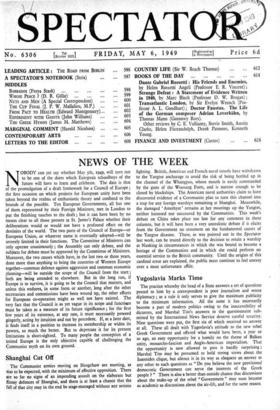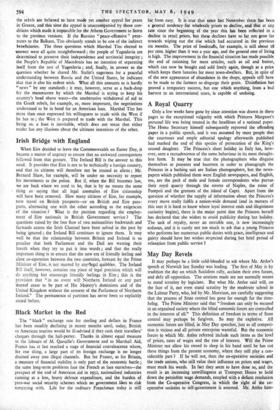Yugoslavia Marks Time
The practice whereby the head of a State answers a set of questions posted to him by a correspondent is poor journalism and worse diplomacy ; as a rule it only serves to give the maximum publicity to the minimum information. All the same it has necessarily become a part of modern politics owing to the inaccessibility of dictators, and Marshal Tito's answers to the questionnaire sub- mitted by the International News Service deserve careful scrutiny. Nine questions were put, the first six of which received no answer at all. These all dealt with Yugoslavia's attitude to the new rebel Greek Government and offered what would have been, a year or so ago, an easy opportunity for a homily on the theme of Balkan unity, monarcho-fascism and Anglo-American imperialism. That the opportunity is now allowed to pass is hardly surprising ; Marshal Tito may be presumed to hold strong views about the Ioannides clique, but silence is in its way as eloquent an answer as any other to such questions as " Do you believe the new provisional democratic Government can serve the interests of the Greek people ? " There is also a better than outside chance that discussions about the make-up of the rebel "Government" may soon become as academic as discussions about the air-lift, and for the same reason
the rebels are believed to have made yet another appeal for peace in Greece, and this time the appeal is unaccompanied by those con- ditions which made it impossible for the Athens Government to listen to the previous versions. If the Russian " peace-offensive " pene- trates to the Balkans, Tito obviously stands to be one of the indirect beneficiaries. The three questions which Marshal Tito elected to answer were all quite straightforward ; the people of Yugoslavia are determined to preserve their independence and territorial integrity ; the People's Republic of Macedonia has no intention of separating itself from the rest of Yugoslavia ; and, finally, in answer to the question whether he shared Mr. Stalin's eagerness for a peaceful understanding between Russia and the United States, he indicates that that is also his ardent wish. What all this amounts to is hardly "news " by any standards ; it may, however, serve as a back-drop for the manoeuvres by which the Marshal is trying to keep his country's head above water—the unobtrusive withdrawal of aid to the Greek rebels, for example, or, more important, the negotiations understood to be in hand for an American loan. Marshal Tito has more than once expressed his willingness to trade with the West if he has to ; the West is prepared to trade with the Marshal. This being so. a loan is inevitable, which does not mean that either trader has any illusions about the ultimate intentions of the other.







































